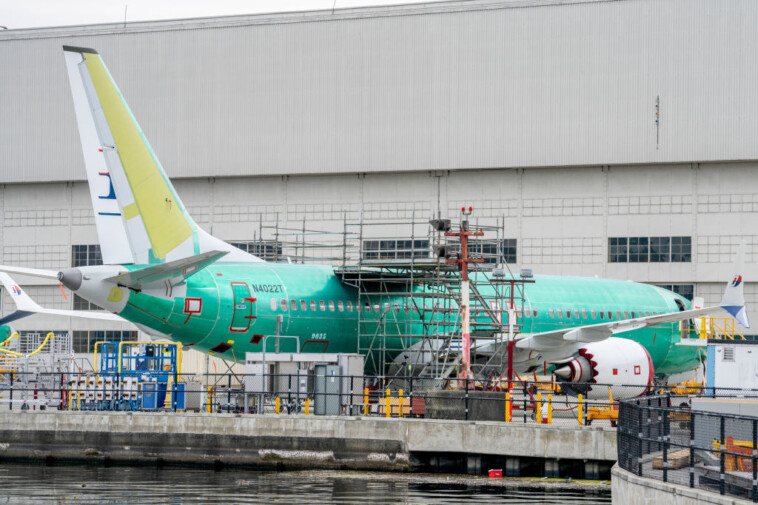Put yourself in the shoes of a senior official in the Biden-Harris administration. Say you’re running the DOJ. Right now you know that, in just a matter of months, you could be out of a job. In fact, that seems pretty likely at this point. If there’s any important cases you want to pursue, or policies you want to defend, now’s the time to do it. This is your opportunity to cement your legacy, at least until the next administration fires you and completely dismantles it.
Given that setup, what would you make a top priority? With so many things going wrong in this country, what are the battles you’d choose to fight, with the limited time you have left? We’re not quite in a “lame duck” period, technically speaking, but everyone in the administration is asking this question right now.
And as low as your expectations may be for the Biden-Harris administration, their answer to that question is pretty remarkable. In what could very well be their final days in power, senior leaders in the federal government are going to federal court to defend DEI policies. And I’m not talking about just any garden-variety DEI policies here. As we speak, the Justice Department is going to court to demand that DEI is used in the selection process to appoint an independent monitor to oversee Boeing, the aircraft manufacturer. The job of this independent monitor is to make sure that Boeing stops making planes that fall apart in the sky, or fall out of the sky completely.
In other words, the Biden-Harris DOJ is fighting to ensure that the second-largest commercial jet manufacturer in the world is supervised by a DEI hire. What could possibly go wrong?
If you’ve been following Boeing lately, you know that a lot can go wrong. There’s a decent documentary on Netflix called “Downfall: The Case Against Boeing” that outlines a lot of the background. But here’s the gist. As you probably remember, there were two fatal crashes involving Boeing 737 MAX aircraft in 2018 and 2019. A total of 346 people were killed in just a few months.
WATCH: The Matt Walsh Show
Investigation revealed that the crashes were linked to Boeing’s decision to accelerate production of the 737 MAX to compete with their rival, Airbus. The design of Boeing’s new 737 MAX was a lot like the older Boeing jets, with one key exception: the engines were larger and they were positioned further forward on the plane. While this helped with efficiency, it came with a side effect, which is that the plane had a tendency to pitch upwards during flight.
To counteract that tendency, Boeing designed a new software program that they installed on their new 737 MAX aircraft. The idea was that the software would automatically lower the nose to a level position, if the plane started creeping upwards. It was supposed to be a subtle fix that the pilots wouldn’t really notice. The problem is that the software was completely dependent on one sensor on the plane, called the “angle of attack” sensor. And if that sensor failed for whatever reason, or provided inaccurate data, the plane would inaccurately believe that it was climbing too quickly. And the software, in response, would make the plane plunge towards the Earth. And that’s exactly what happened, in both cases. Here’s coverage of one of the crashes:
What’s incredible about this crash — the Ethiopian airlines one — is that it happened after the Lion Air crash several months earlier. And after the Lion Air crash, Boeing sent out advisories to a bunch of airlines, warning them about their software. They said that, if they encounter a similar issue, pilots should just turn off the electrical system of that part of the aircraft, to disable their software entirely.
The problem is that, when the Ethiopian pilots did that, they encountered a bunch of other unexpected issues that they weren’t really trained on. They were panicking, and during the chaos, they left the throttle on maximum, which made it impossible to control the plane without the help of the electrical system. And when they tried to regain some control, they turned the electrical system back on, at which point the plane promptly crashed itself.
Obviously, there are a lot of failures that occurred in this whole situation. The regulators at the FAA delegated a lot of their responsibilities to Boeing, which meant that Boeing was in charge of certifying the safety of its own software. Additionally, Boeing knowingly made false representations about its software during the certification process.
That’s not in dispute. Boeing admits this. This summer, Boeing agreed to plead guilty to “conspiring to defraud” the government concerning the 737 MAX’s software. Then Boeing and the DOJ filed a plea agreement in court so that a judge could review it. The plea agreement essentially makes Boeing — as a company — a convicted felon.
But to his credit, the judge, whose name is Reed O’Connor, isn’t signing off on the plea deal — at least not yet. This is a bit like the situation with Hunter Biden this summer. Just because both parties agree to a plea deal, that doesn’t mean the judge has to accept it. And in this case, there’s a very important reason why the judge won’t accept it.
From the judge’s order this month: “The Agreement mandates an independent compliance monitor to assess whether Boeing has adequately mitigated the risk of providing false or fraudulent information to the Federal Aviation Administration and other government regulators. … Like many of the Agreement’s other provisions, the victims strongly oppose the Agreement’s compliance monitor requirements. Among other reasons, the victims argue the Court should reject the Agreement because it allows the Government, not the Court, to select a monitor with input from Boeing and ‘in keeping with the Department’s commitment to diversity and inclusion.’”
In other words, both the judge and the victims’ families have an issue with this provision. And you can see why. When both the regulator and the airline manufacturer mess up, causing the deaths of hundreds of people, then you’d think you’d want to bring in the most competent people you can find, in order to make sure that it never happens again. But that’s not what’s happening here.
When the judge asked the government’s attorney, Sean Tonolli, to explain what exactly this “diversity, equity and inclusion” policy would entail, Tonolli responded that he’s not an expert in the topic. But he eventually got around to saying “diversity” refers to “race, gender, background and any number of factors, including background and experience.” Tonolli added that “inclusion” is, “another way of maybe saying the same thing and not excluding people because of any characteristic that would be included in diversity.” Then he tapped out. He said he couldn’t provide any more information than that. But he did insist that the government wouldn’t pick someone who was unqualified.
That led the judge to ask, “Did the department used to exclude certain people on race, gender, and other things?” And in response to that question, Tonolli responded: “Not to my knowledge.”
That was an alarming answer, to say the least. Especially when you’re talking about making sure that more planes don’t fall out of the sky, the answer should be an unequivocal “No, we definitely wouldn’t exclude anyone based on race or gender.” It’s wrong to discriminate on the basis of race or gender in any context. But it’s completely insane to do it when you’re talking about regulating Boeing, which if you haven’t noticed, is having a lot of problems right now — both on this planet and in space.
So the judge asked Boeing for their input. But they just deferred to the government’s answer. Then the judge pulled up Boeing’s website, where he found that the company has a “set of aspirations” that it plans to achieve by next year. Those aspirations, which are based on DEI, include explicit quotas on the basis of race, including Boeing’s efforts to, “[i]ncrease the Black representation rate in the U.S. by 20%” and “[c]lose representation gaps for historically underrepresented groups.” The judge also found that Boeing pays its executives bonuses depending on how many of their DEI goals they’ve achieved.
At the moment, we don’t know exactly how this legal battle will play out. The judge has said he wants a full hearing on this, before he signs off on any plea agreement. He wants to make sure that the Biden-Harris administration is going to select someone who can do the job, before any more people die in Boeing airplanes. And based on the statements of Boeing and the Biden-Harris administration so far, the judge doesn’t have those assurances.
If you look at any of the corporate media coverage of this story, you’ll find a lot of snark directed at the judge. Reuters, for example, ran this headline: “How a US judge injected culture wars into Boeing 737 MAX plea deal.” They interviewed a lawyer who criticized the judge, saying he was acting “incredibly unusual.” CNN meanwhile accused the judge of engaging in a “politically tinged” courtroom battle.
This is the same tactic we see in the trans debate, and in so many other areas. Left-wing activists implement some new, insane policy. And when you push back against it in any way, or even ask questions about it, you’re accused of injecting a “culture war” in a way that’s somehow inappropriate. It’s apparently not injecting a”culture war” when Boeing and the federal government both decide to start hiring people on the basis of their skin color. But it’s definitely a “culture war” when a judge asks if we’re hiring the most qualified people to make sure that more planes don’t crash themselves into the ocean.
The reason these outlets are lashing out like this is that they recognize this judge’s ruling is significant. They realize they’re indeed losing the culture war that they started. This is the first time, that I’m aware of, that a federal judge has explicitly called out DEI in the context of an ongoing case. He’s demanded to know what exactly it entails. And in response, the government and Boeing — which both practice DEI — couldn’t even answer the question. It’s yet another sign that the tide is turning sharply against the whole concept of diversity, equity and inclusion, particularly when lives are at stake.
MATT WALSH’S ‘AM I RACIST?’ COMING TO DAILYWIRE+ OCT. 28
When I started working on my film “Am I Racist” a few years ago, developments like this were pretty difficult to imagine. But throughout the process, we all knew that taking down DEI meant exposing exactly what it is, in practice. Once reasonable people can see exactly what diversity, equity, and inclusion entails, then they turn against it. They recognize that it’s immoral and unethical, not to mention dangerous in some cases. And they also recognize that the high priests of the DEI cult actually have no idea what they’re talking about. Like Boeing’s lawyers, or the various “experts” and activists I spoke to in the film, these people can’t even define the terms that they’re constantly repeating.
That’s the main reason I’m excited about the streaming release of “Am I Racist.” As you may have heard, my new film is coming to DailyWire+ on Monday. We’ll be able to show the film to people who, for one reason or another, weren’t able to see it in theaters. We’ll be exposing the DEI grift to an audience of millions more people. And when it comes to DEI, exposure is fatal. Mockery is intolerable, too. And we do a lot of both in this film.
Thanks to everyone who’s supported us in theaters, we produced the top documentary of the decade. We showed how some of the biggest names in the industry are complete and total frauds. And we had a lot of fun doing it. I hope you’ll support us.
If you’re not subscribed to Daily Wire and you want to watch the film, you should do that today.
We didn’t start this particular “culture war.” But because of your support, it’s very clear that we’re now winning it.



